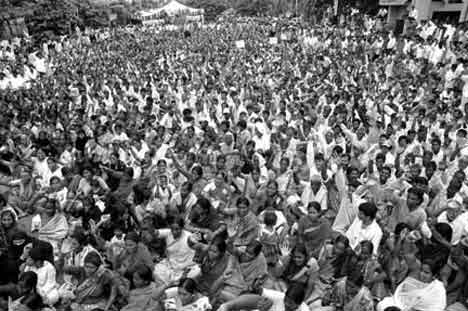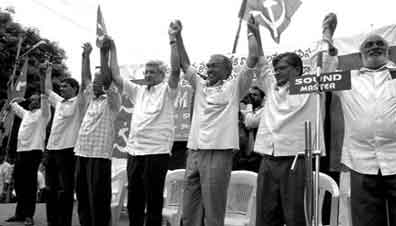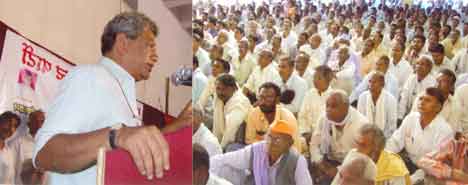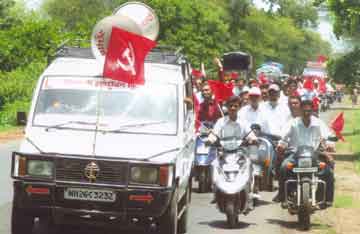 People's Democracy
People's Democracy
(Weekly
Organ of the Communist Party of India (Marxist)
No. 36
September 03, 2006
(Weekly
Organ of the Communist Party of India (Marxist)
|
Vol.
XXX
No. 36 September 03, 2006 |
AUGUST CAMPAIGN MOVEMENT ROLLS ON
Intensify Fight For Land, Food & Employment

A view of people attending the August campaign mass public rally in Hyderabad on August 23, 2006
A MASSIVE rally and public meeting was held in Hyderabad on August 23, 2006 as part of the ongoing August campaign movement of the Party. Thousands of people, women and the poor in substantial number, participated in the rally organised by the Andhra Pradesh state committee of the CPI(M). The rally started from Sundarayya park at Baghlingampally, marched forward via Narayanguda, Himayathnagar and Ashoknagar and reached Indira park. Holding banners, Red flags and placards and raising resounding slogans, denouncing the anti-people policies of the central and state governments, the rallyists were led by the CPI(M) Polit Bureau member and state secretary B V Raghavulu, state secretariat member Y Venkateswara Rao, city committee secretary P S N Murthy and other leaders. The rally culminated into a public meeting at Indira park.
Addressing the public meeting, Prakash Karat, general secretary of the CPI(M), explained that the central committee of the Party had decided to organise the campaign by conducting more than 200 massive public meetings all over the country and explain to the people the economic policies of the government of India, the economic challenges and problems confronting the people and the alternative policies of the CPI(M). Following the seventh consecutive electoral victory of the Left Front in West Bengal with three-fourths majority and the victory of the LDF in Kerala with overwhelming majority – both led by the CPI(M) – the continuance of the CPI(M)-led Left Front government in Tripuira and the emergence of the Party as the third largest party in the Lok Sabha, there has been intense debate in the country on the policies of the Left, especially of the CPI(M), and as to why the people have been electing these governments repeatedly, Prakash Karat pointed out.

Prakash Karat, Raghavulu and other CPI(M) leaders greeting the public at the rally in Hyderabad
Prakash Karat explained that the main reason for the people electing the LF in West Bengal for the seventh consecutive term - an international record by itself - was distribution of land to the landless people, of whom 56 per cent belonged to the sceduled castes and scheduled tribes. Similarly, the first Communist government formed in Kerala in 1957 under the leadership of Comrade E M S Namboodiripad initiated measures for enacting laws and implementing land distribution and the subsequent governments formed under the leadership of the CPI(M) pursued the same. In Tripura, too, successive governments led by the CPI(M) amended the relevant laws and distributed surplus land to the poor. As a result of possession of land by the poor, the people have been electing these governments repeatedly, Prakash Karat asserted. The trend in other states, like Andhra Pradesh, Maharashtra, Karnataka, Uttar Pradesh etc, is in the reverse. The governments are dispossessing the farmers from their lands and handing over such lands and lakhs of acres of wastelands to the multinational corporations, he said. The government of India, even violating the Constitution, had brought about a new Act, enabling allocation of 5000 to 10000 acres of land to big private companies all in the name of special economic zones, Prakash Karat criticised. There were no indications of payment of appropriate compensation to the farmers, who were dispossessed from their land and deprived of their livelihood. As a result of this trend, crores of the poor people eking out their livelihood based on land were being rendered unemployed, Prakash Karat said. This is one of the biggest problems in the country.
In the case of forest lands also, the government has been violating the Constitution by dispossessing the people of scheduled tribes, who had special rights on such lands, and giving the same on lease to multinational corporations and other big companies, he criticised. In this connection, he referred to the moves of the state government to dispossess the poor people in the outskirts of Hyderabad for laying an outer ring road. Both the central and state governments have been pursuing the policy of removing the common people settling on lands at the outskirts of towns and cities and handing over the same to the bigwigs, he criticised. The CPI(M) had decided to fight these policies of the governments and for implementation of land reforms, Prakash Karat announced.
The second main problem was food, he said. As a result of the efforts of our farmers after independence our country could achieve self-reliance in production of foodgrains. However, as a result of the policies of the government, the farmers have been facing a crisis in agriculture today with even the yield of crops coming down, he explained. Procurement of foodgrains by the Food Corporation of India has come down. The government announced that it would import wheat every year, as it did this year by importing 35 lakh tonnes of wheat, he explained. With a view to squeezing the public distribution system (PDS) further, the government of India had issued an order two months back, informing the states of a cut in food supply, leading to a cut in rations being distributed through the PDS outlets as also the food subsidy being given by the government, he said. In a country where children below the age of five years were malnourished and where starvation deaths were taking place, dismantling PDS meant telling the people to starve to death, Prakas Karat warned. Terming this anti-people policy a ghastly crime, he demanded the government to give up the policy of importing foodgrains, prevent crisis in agriculture in the country by extending support to the farmers to enhance yield of crops and strengthen the PDS. Otherwise, the CPI(M) would launch a country-wide movement to achieve these objectives, he announced.
The third main problem confronting the people of the country was unemployment, Prakash Karat said. It was a serious problem both in rural and urban areas, covering different sections of the people, agricultural workers, women and the youth, he said. As a result of the pressure brought upon it by the Left parties, the UPA government had enacted the Rural Employment Guarantee Act whose implementation was confined to 200 districts in the country. As promised in the CMP and by the Congress, the scheme should be extended to the entire country, including urban areas, he demanded. For achieving this demand, the CPI(M) would launch a country-wide agitation, Prakash Karat announced.
Referring to government’s lament of not having resources to increase spending on education, health, employment guarantee, PDS etc, Karat said if there was a political will, resources could be mobilised and cited the 13 suggestions given by the CPI(M) to the government for mobilisation of resources. He reminded that the Party had demanded the government to increase taxes on the rich and impose tax on incomes generated by business in the stock markets with lakhs of crores of rupees of foreign funds. However, the government was not prepared to do so, he said. The CPI(M) had decided to widely propagate the alternative ways of resource mobilisation among the people, he said.
There were issues in the CMP which did not require any expenditure, one being ensuring 30 per cent reservations for women in the parliament and the legislative assemblies, he said. The people were not prepared to give any more time to the government and the CPI(M) was demanding it to introduce the bill intended for 30 per cent reservations for women in the next session of the parliament, he said. Similarly the Party would insist on enactment of tribal forest rights bill, he said. Karat also lambasted the UPA government for continuing the pro-US policy adopted by its predecessor, the BJP-led government, to become a junior partner of the US. The CPI(M) and the other Left parties were telling the government to pursue an independent foreign policy and an independent nuclear policy, without entering into agreements with the US that were detrimental to the interests of our country, he said.
B V Raghavulu, who presided over the meeting, explained that the CPI(M) had made it clear to the UPA government and the Congress leadership that it was not interested in sharing power by joining the government and that the latter should implement the promises made in the CMP. Had the CPI(M) wanted to share power in the government, going by its strength in the parliament, it would have got at least 25 ministers and probably the deputy prime ministership also, he said. The present campaign was intended to explain to the people how the Left parties have been bringing pressure on the government to implement the CMP, he said. Referring to the situation in the state, Raghavulu explained that the Congress had come to power, criticising the policies of the erstwhile TDP government and promising to reverse them. After coming to power the Congress government has been pursuing the same policies adopted by the TDP government and parroting the words of the World Bank, he criticised. While the Chandrababu Naidu government had removed 81,000 employees from the public sector units, the Rajasekhara Reddy government was saying it would remove 61,000 employees from the public sector units. Reminding that the CPI(M) had fought against the World Bank-inspired policies, Raghavulu asserted that it would continue to fight against those policies and warned that the Congress government would also meet the same fate as of the TDP government.
Raghavulu announced that the CPI(M) would mobilise the dalits and other poor people on a large scale and launch a big movement, demanding the government to give the lands assigned to them as also the lands they have been cultivating. The government had acquired and auctioned the lands of dalits at Kokapet at the outskirts of Hyderabad for Rs 700 crore. The CPI(M) had represented to the chief minister on the issues of the outer ring road, explaining that it had taken 114 turns with a view to avoiding acquisition of the lands of the rich and demanding for a judicial enquiry, Raghavulu said. He demanded the government to announce the list of names of the people who were losing their lands under the outer ring roads, if it had guts.
Raghavulu found fault with the government for allotting thousands of acres of land to bigwigs, MLAs and the MPs, while claiming that it had no lands to allot to the poor. Raghavulu announced that, in the coming period the CPI(M) along with other Left parties and mass organisations would launch agitations on the problems of the dalits, tribals, agricultural workers and extend support to the agitations of the employees and workers, demanding the government to withdraw its anti-people policies.
Paturu Ramayya, member of the central committee of the CPI(M), and state secretariat members of the Party S Mallareddy, Y Venkateswara Rao, S Veeraiah, Ch Sitaramulu and G Nagayya were also on the dias. P S N Murthy welcomed the leaders and at the end proposed a vote of thanks.
(M Venugopala Rao)
IN NAGPUR
AN impressive public meeting was organised by the CPI(M) in Nagpur on August 20, 2006 as part of the August campaign movement. Polit Bureau member Sitaram Yechury was the main speaker.

Sitaram Yechury addressing the August campaign public rally at Wardha, Maharashtra on August 20, 2006
The August campaign was conducted vigorously in Nagpur from August 5 as per the call given by Party central committee. Many local-level public meetings were held in the district; leaflet distribution programmes were carried out by different units explaining the Party position on various issues; a two-day jatha was organised in Nagpur city; as many as 45 street corner meetings and distribution of around 10,000 leaflets were distributed in the city.
This meeting was the culmination of the fortnight long campaign in Nagpur. Sitaram Yechury in his speech appealed to the gathering to come forward to build a new India with focus on the well being of the common people. The political change provided by last Lok Sabha elections has provided an opportunity for this, he said. He dealt with many issues, particularly of the suicides of farmers in Vidarbha region. He felt that the package announced by prime minister cannot be a solution to this problem and much more needs to be done to ameliorate the suffering of the peasantry in the region. The loans to farmers must be waived off as was done by the Tamilnadu state government. He also criticised the move of the UPA government to hike the prices of food grains distributed through the PDS. Yechury asserted that to provide relief to the farmers, the forward trading in essential commodities should be stopped forthwith. He also spoke about the Indo-US Nuclear Deal and said that India will have to pay heavy price for signing this deal.
Yechury said that with the defeat of the BJP and its allies at the centre, the threat of communalism has been reduced to some extent and this provides an opportunity to concentrate on addressing people’s problems. For this he wanted the government to speedily implement the Common Minimum Programme. He also wanted the people to build up pressure on the government for this through popular struggles. That would strengthen the Left’s fight inside the parliament for implementation of CMP. Yechury felt that the danger of terrorism cannot be ignored but stressed that it cant be solved only through POTA like laws. He reminded that even during the BJP regime – when POTA was enforced – there were numerous terrorist attacks, like one on parliament, Red Fort, Akshardham mandir in Gujarat, twice on Raghunath Mandir in Jammu & Kashmir etc.
The salient feature of this meeting was that a large number of people from all walks of life were present along with Party members and sympathisers. The meeting was presided over by Manohar Muley, CPI(M) state secretariat member while Arun Latkar, CPI(M) Nagpur district secretary introduced the purpose of August campaign. Ramesh Chandra Dahiwade (Chandrapur), Natthu Mahure (Gondia), Shankarrao Danao (Yavatmal), Manohar Rangari (Bhandara) were also present on the dias.
(Arun Latker)
IN PUNE
BRAVING torrential rain, over 1200 people gathered at the Balgandharva Rangmandir at Pune on August 11, 2006 to listen to CPI(M) central committee member Subhashini Ali as part of the Party’s August campaign in Maharashtra. The fact that more than 80 per cent of them were women caused Subhashini Ali to invoke the memory of Savitribai Phule, who along with her husband Mahatma Jotiba Phule hailed from Pune and pioneered movements against caste and gender oppression during the mid-19th century. She also reminded the audience that Pune was also the birthplace of the CPI(M)’s outstanding revolutionary leader, Godavari Parulekar who led the revolt of the Warli Adivasis in Maharashtra.

A view of the jatha held in Wardha as part of the August campaign on August 20, 2006
In a simple language, peppered with Marathi sentences, the CPI(M) leader explained the nature of the August campaign, and the need felt by the Party to go to the people and explain its stand on several issues on which it has severe differences with the ruling UPA government. It was necessary to dispel the notion that the CPI (M) was part of the government, she said, and clarify once again that the Party supported the UPA only in order to keep the discredited NDA out of power, as mandated by the 2004 parliamentary elections. She criticised the UPA government for its soft stance vis a vis communal forces, and pointed how the BJP was also one with the ruling alliance when it came to pushing anti-people economic policies in the country. The August campaign was a unique program adopted by the Party to take the issues being raised by its MPs on behalf of ordinary people to the masses.
She launched a scathing attack on the union agriculture minister Sharad Pawar who hails from Maharashtra, and Pune district in particular, severely castigating him for the huge rise in prices of essential commodities, especially food grain. She pointed out how the government of India is importing expensive wheat from the same Australian company that was permitted to procure wheat from Indian farmers at much lower prices! Although there was much concern about the levels of pesticide in soft drinks, not many were aware of the fact that the government had actually revised standards to permit the import of grain with high levels of pesticide content to accommodate MNC interests, she said. The earlier NDA government had virtually dismantled the Public Distribution System, but the UPA government, despite its commitment in the CMP, had failed to reverse the trend and was in fact going even further in destroying whatever remained of it. She demanded that the amendments made by the NDA to the Essential Commodities Act be revoked. Drawing attention to the huge number of suicides committed by farmers, especially in Vidarbha, she said that the CPI(M) had demanded waiver of loans and a pro-farmer credit policy, including implementing the recommendations of the Swaminathan Commission to provide agricultural loans at 4 per cent.
Subhashini stressed the fact that the CPI(M) had been consistently pressing for the passage of the Women’s Reservation Bill in parliament and was continuously asking the UPA government to live up to its electoral commitment. The Party sees the question of political representation of women not just in term of gender justice but as an essential aspect of strengthening the democratic system in the country. The Party sees women’s issues as integral to society, and was deeply concerned about the sharp decline in the proportion of women in population. One of the demands of the August campaign was strict measures to counter the falling sex ratios, she said. She called upon the people to unify in order to gather strength of elephantine proportions which would wake up the sleeping Kumbhakarna of the UPA government.
Presiding over the public meeting, Ajit Abhyankar, CPI(M) Pune district secretary and state secretariat member said that the CPI(M) was involved in a process of redefining the political discourse in the country. The Party was not simply indulging in rhetorical criticism, but presenting concrete alternatives. These were not just in the form of proposals, but actual measures taken in the Left-led states of West Bengal, Kerala and Tripura. He gave the example of how the LDF government in Kerala immediately passed legislation to regulate the entire process of admissions and fees in private educational institutions in the state, putting into practice its demand for social control over private educational institutions. Unlike the BJP and its partners, who were simply interested in disrupting parliamentary proceedings, the CPI(M) and the Left was committed to the cause of the people, and he called for an understanding of the CPI(M)’s alternative vision for the people-centred development of the nation.
Kiran Moghe, a member of the CPI(M) state committee welcomed the gathering and made the opening remarks. Others present on the dais included AIDWA national vice president Kalindi Deshpande, CPI(M) state committee member Shubha Shamim, CPI(M) Pune district committee members Saraswati Bhandirge, Mahendra Thorat, Vasant Pawar, Jitendra Shinde, Suresh Mohite and SFI State secretary Maharurdra Dake.
(Kiran Moghe)